In the day prior to riding the K1600 super tourer in South Africa, I had several opportunities to ask BMW engineers questions about how it compares with Honda’s Gold Wing, a veritable icon of the luxury-touring class.
“No, this isn’t like a Gold Wing,” they’d say. In fact, the GL1800 BMW last had for comparative purposes was several years old, and they couldn’t recall the last time anyone had ridden it.
But how could BMW not benchmark the segment’s class leader?
Both the GTL and the GL have luxurious accommodations, six-cylinder engines twisting power through a driveshaft, considerable luggage space and excellent wind protection from encompassing fairings.
Outward similarities aside, BMW Motorrad General Director Hendrik von Kuenheim flatly denies the Gold Wing was the target. Rather than building a luxury-tourer like the Wing, the blunt yet exceptionally affable chief tasked his engineers with creating a “supreme” tourer with greater sporting intent. After all, he adds, the touring market is “the domain of BMW.”
The K1600GTL (and its sportier twin brother GT, to have its own review in a few weeks) is a clean-sheet design that boasts a plethora of desirable standard and optional equipment.
| K1600 Goodies |
| * Ride-by-wire throttle control delivering three options of responsiveness |
| * Dynamic Traction Control |
| * Electronically adjustable suspension (ESA II) |
| * Innovative Multi-Controller wheel on left handlebar to navigate through various menu options |
| * Detachable luggage |
| * Adaptive Headlight that directs its beam around corners |
| * Electrically adjustable windshield |
And what do these have in common? None are available on the long-in-the-tooth GL1800 Gold Wing, which debuted way back in 2001. Although the GL receives minor revisions for the 2012 model year, we’re still waiting on the ability to adjust the height of its windshield with a button, a device now nearly ubiquitous among bikes with a serious touring intent.
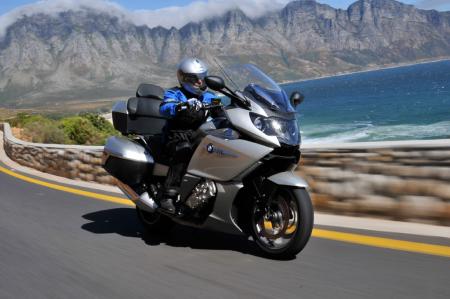 The 2012 K1600 GTL is packed with high-tech exclusive features. The 2012 K1600 GTL is packed with high-tech exclusive features. |
At one time we bought into Honda’s logic that an electric motor to raise the GL’s screen (it’s manually adjustable for height) would add unnecessary weight, but the K1600 proves the two aren’t mutually exclusive. The Honda scales in at more than 900 lbs full of fuel, while the GTL is a relative flyweight at 767 lbs. (Incredibly, BMW says the K16-GTL is lighter than the former K1200LT by more than 110 lbs!)
Devotees of old Goldie might decry this comparison as unfair since the 1832cc flat-Six Honda is in a different displacement class than the 1649cc inline-Six BMW. But if that’s the yardstick, then the GTL punches easily above its weight. Its undersquare (and, hence, relatively narrow) mill churns out a purported 129 ft-lb of torque at 5250 rpm, reaching a crescendo of 160 horses at its 7750-rpm peak. That should translate to 135 hp at its 190/55-17 rear tire, almost 40 ponies more than the Honda.
Sing, Sing A Song
Simply put, this is one of the most sonorous streetbike engines ever made. It lights up with a bark that portends wicked things to come, and despite its long-stroke architecture, it spins up far quicker than expected for a touring bike’s motor.
But the really unexpected payoff occurs when the loud handle is twisted hard, as the exhaust note crawls over itself like the best sporty I-6s do – think a miniature Jaguar or, of course, a BMW car engine after inhaling a whiff of helium. It whoops rapturously after 6500 rpm, especially when intake honk at full throttle is added, deliciously so when the delicate yet angry note is bouncing off canyon walls back into its smiling pilot’s ears.
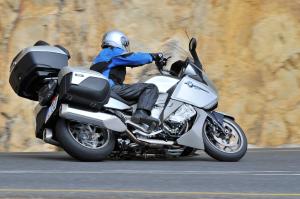 And it also functions perfectly. Throttle response has zero abruptness, even on the most aggressive “Dynamic” riding mode (also adjustable between Rain and Road modes via the right-side switchgear or multi-controller). And there are no issues with excess engine heat like some other big-engined tourers.
And it also functions perfectly. Throttle response has zero abruptness, even on the most aggressive “Dynamic” riding mode (also adjustable between Rain and Road modes via the right-side switchgear or multi-controller). And there are no issues with excess engine heat like some other big-engined tourers. Also impressive is the liquidy smoothness of the engine itself, as I-6s always are with their naturally balanced primary and secondary forces. There is only the faintest of vibes filtering to the rider at any speed, and the engine is so smooth motoring at 100 mph in top (sixth) gear that it can also easily cruise at that speed in fifth without bothering its rider.
In the inevitable comparison with the Honda, the GL does seem to have a bit of an advantage when revs are below around 2500 rpm, but the K16 likely out-thrusts the Wing everywhere else. Speed demons will be happy to know there is enough power on tap to exceed 140 mph, and the aluminum bridge chassis has the requisite stability to ably handle it.
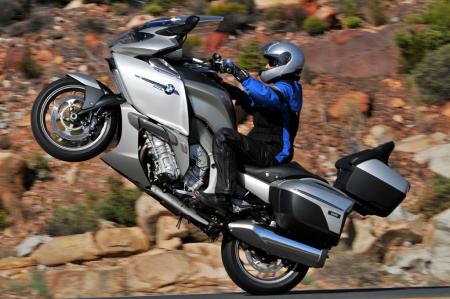 The Six appeal doesn’t stop at the engine note. The Six appeal doesn’t stop at the engine note. |
When not racing Hondas, the K16 mill functions admirably in its civilized street role. Although its clutch engages near the end of its travel, it still modulates easily when balanced against its deep well of power. And its gearbox is exemplary – we never missed a shift during two days of riding, and it accepts upshifts even without a clutch. Neutral is easy to locate.
Steering Surprises
We’ve always admired the Gold Wing for its ability to be hustled through curves with alacrity that belied its considerable size, but the K1600 series brings the big-boned dancing partner to a new level of agility. It’s amazingly flickable. Yes, I said flickable. It turns in neutrally and continues through a lean angle that would make a Wing-er envious – the Beemer is the easy racetrack winner if you were ambitious enough to bring these mega-baggers to a track.
 The GTL is guided by a Duolever front end borrowed from the now-defunct K1300GT, and it works really well in this application. Steering effort is much lighter than expected, and partial credit is due to excellent new Metzeler Z8s that were developed in conjunction with the K16. The Duo’s design naturally limits fork dive under hard braking while not feeling entirely disconnected from the front axle.
The GTL is guided by a Duolever front end borrowed from the now-defunct K1300GT, and it works really well in this application. Steering effort is much lighter than expected, and partial credit is due to excellent new Metzeler Z8s that were developed in conjunction with the K16. The Duo’s design naturally limits fork dive under hard braking while not feeling entirely disconnected from the front axle. Not Your Dad’s Suspenders
Bump absorption is provided by just a pair of hydraulic dampers, one in the Duolever up front and one in the Paralever rear. The GTL’s Premium Package (a $2645 upcharge over the base $23,200 MSRP) includes BMW’s sweet ESA II suspension that enables suspension adjustments at the touch of a button. In addition to Comfort, Normal and Sport, ESA also provides additional settings dependent on loads, i.e. luggage and passenger weight.
ESA is a boon for any type of bike, and it’s even more valuable on a touring machine that is likely to travel over nearly every type of road. It’s a wonderful thing to be riding a sinuous mountain road in buttoned-down Sport mode, then flip it over to Comfort when the twisties become a freeway. We didn’t get a chance to sample the base suspension, but we were really impressed with the alternative setups of the GTL’s ESA, providing firm response when needed, then plushness when comfort becomes the priority.
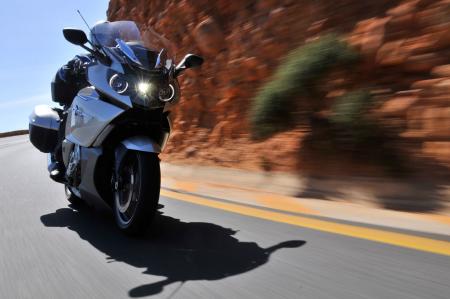 The K1600 is a real autobahn-er. The K1600 is a real autobahn-er. |
Smart Retardation
The GTL proves to be up to the task of slowing down 900-plus pounds of bike and rider, as it uses a potent triple-disc combination of brakes with BMW’s part-integral ABS as standard equipment. Forget the old concerns about antilock and linked brakes, as this thoroughly modern set performs seamlessly, even when mauling the dual 4-piston calipers up front and 2-piston rear.
Feel from both ends is solid and precise, and souring ABS feedback is almost non-existent even with tires howling. As for the linked component, it works so well that I completely forgot they were even coupled. This is an excellent system with the safety benefit of ABS. Trail braking does nothing to upset the chassis or cause the bike to stand up and alter its line.
Air Management
BMW has three wind tunnels, so it’s not surprising that the GTL has well-developed aerodynamics. Its windscreen is a big one, with the added benefit of height adjustability over a vast range. At 5-foot-8, my eyes are just below the upper edge at its lowest level. Taller riders can see over it but experience slight turbulence unless it is raised slightly. Riders of all sizes are sheltered when the screen is at its highest position – its coverage is incredibly encompassing.
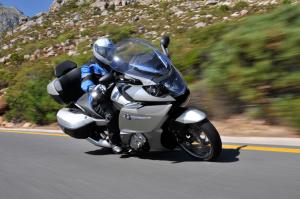 In hot conditions, a rider can dramatically alter the airflow by using innovative flip-out vents on either side of the fairing. BMW calls the section below the nose fairing and above the upper side fairings an air channel, and the chrome pieces between them can be manually flipped outward to grab oncoming air and send it at the rider. By redirecting airflow along this key channel, it completely alters the stream of air swirling around a rider and brings cooling relief. Very simple yet extremely effective.
In hot conditions, a rider can dramatically alter the airflow by using innovative flip-out vents on either side of the fairing. BMW calls the section below the nose fairing and above the upper side fairings an air channel, and the chrome pieces between them can be manually flipped outward to grab oncoming air and send it at the rider. By redirecting airflow along this key channel, it completely alters the stream of air swirling around a rider and brings cooling relief. Very simple yet extremely effective. Ergo, Ergos
Built to cover long distances in comfort, the GTL is set up with a perfectly neutral riding position. The handlebars are set right where your hands naturally fall, and feet are positioned just slightly forward of a rider’s butt. Our test bike was fitted with the optional low seat placed at just 29.5 inches. This makes the GTL easy to manage during low-speed maneuvers, but tall riders likely will prefer the standard 30.7-inch seat for long days in the wide and supportive saddle. The fuel tank is narrow between the knees despite its considerable 7.0-gallon capacity.
Handlebar controls are thoughtfully arranged, starting with finely adjustable levers. The turn signals are now triggered by a traditional single switch on the left handlebar, augmented with an effective self-canceling program. Standard cruise control is operated via buttons on the left bar, and the system is very well controlled
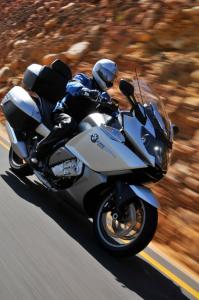 An array of other features – including heated grips and seat, ESA and audio functions – can be set by BMW’s inventive multi controller. The MC is a knurled wheel that rotates around the left handlebar and can be toggled in two directions to select different settings that show up on the easily read 5.7-inch TFT (Thin Film Transistor) color display panel. The MC wheel is intuitive and has a nicely damped and expensive feeling, although it does make the reach to the turn-signal switch slightly longer.
An array of other features – including heated grips and seat, ESA and audio functions – can be set by BMW’s inventive multi controller. The MC is a knurled wheel that rotates around the left handlebar and can be toggled in two directions to select different settings that show up on the easily read 5.7-inch TFT (Thin Film Transistor) color display panel. The MC wheel is intuitive and has a nicely damped and expensive feeling, although it does make the reach to the turn-signal switch slightly longer. Comfort and Convenience
As a high-end touring rig, the GTL is fitted with a surfeit of convenience features. Standard equipment includes heated seats and grips to five levels, cruise control and ABS. Ample luggage space is provided by saddlebags and a top box, each detachable unlike the Wing – the GTL has nearly 470 lbs of available payload capacity. Xenon headlights have a self-leveling feature.
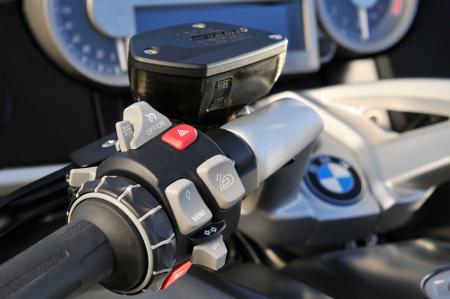 “The world’s most advanced audio and communications system on a motorcycle” includes satellite radio and an MP3 player, all of which can be manipulated by the Multi Controller. The audio system can also be directed via Bluetoooth connectivity so that audio can be sent wirelessly to a communicator system like the BMW unit in the Schuberth helmet we were provided; otherwise, sound is sent to four cockpit-mounted speakers.
“The world’s most advanced audio and communications system on a motorcycle” includes satellite radio and an MP3 player, all of which can be manipulated by the Multi Controller. The audio system can also be directed via Bluetoooth connectivity so that audio can be sent wirelessly to a communicator system like the BMW unit in the Schuberth helmet we were provided; otherwise, sound is sent to four cockpit-mounted speakers. The aforementioned Premium Package brings a new level of equipment to motorcycles. The luxury component includes ESA II, an alarm and a central locking system, the latter not easy to do with removable bags - it uses the same components as BMW cars and makes an identical satisfying “schlup” sound.
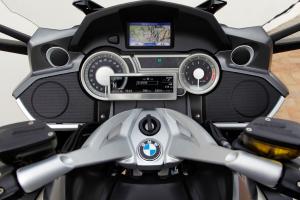 The safety elements of the high-end package consist of gyro-fed traction control, a tire-pressure-monitoring system and the world’s first adaptive headlight fitted to a motorcycle. The innovative headlight uses a servo-equipped mirror to direct the headlight beam in the direction of travel, even around corners. Although we didn’t do any night riding, a table-mounted simulator convinced us of its efficacy, and it will surely be a real benefit to night riders.
The safety elements of the high-end package consist of gyro-fed traction control, a tire-pressure-monitoring system and the world’s first adaptive headlight fitted to a motorcycle. The innovative headlight uses a servo-equipped mirror to direct the headlight beam in the direction of travel, even around corners. Although we didn’t do any night riding, a table-mounted simulator convinced us of its efficacy, and it will surely be a real benefit to night riders. The GTL comes prewired for BMW’s Garmin-built Navigator IV, but it’s available only separately from your dealer for around $850. The Nav IV simply drops in to a built-in cradle and it’s instantly integrated into the GTL’s system, even its Bluetooth arrangement. The nav screen is up high and visible, and it’s cleverly secured in place by the windshield in its low position.
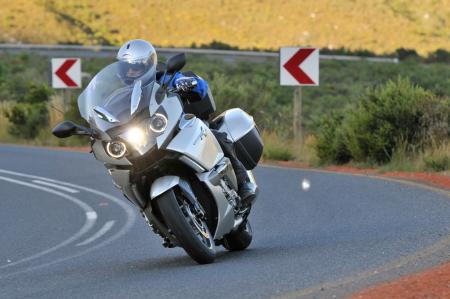 BMW’s Adaptive Headlight cleverly pivots the beam around corners and eliminates the dipped lighting when leaned over. BMW’s Adaptive Headlight cleverly pivots the beam around corners and eliminates the dipped lighting when leaned over. |
Just Short of Perfection
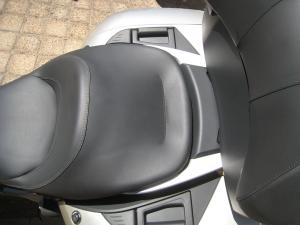 Passenger comfort would be better if the seat was extended further rearward. Passenger comfort would be better if the seat was extended further rearward. |
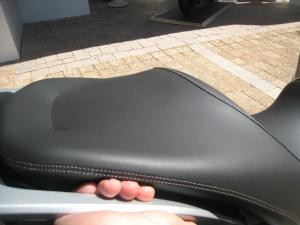 Grab rail access is hindered by the seat’s outer edge. Grab rail access is hindered by the seat’s outer edge. |
The GTL does have one significant foible: passenger accommodations fall way short of the Gold Wing’s. Good comfort exists when a pillion is resting his/her hands on a rider’s waist, with abundant legroom up to the wide and comfy seat. A backrest integrated on the top box provides welcome security.
However, the amount of fore/aft room is somewhat limited. Sitting far back on the seat for the most room, your butt is positioned on the transition from the seat to the nylon box mount, making it feel like you’re sitting in a crevice.
Things fall apart further while riding at a brisk pace when your pillion will want to grip the hand rails. There isn’t sufficient room between the seat edges and the rails to comfortably fit in gloved fingers. And when you do jam them in, the backrest wings awkwardly force the bicep area forward. To riders who frequently travel two-up, this could be a deal breaker, depending on the size of your passenger.
Searching for more nits to pick, the gap between tank and seat is a trifle gauche in light of the otherwise excellent fit and finish of this super tourer built in Berlin. Lastly, the GTL we rode emitted an annoying primary-drive gear whine from 1700 to 2200 rpm, but that seemed to be atypical compared to other K1600s at the launch – the mechanically identical GT I rode was quieter by about 50%. The K16s at the press launch were pre-series production bikes, and BMW engineers note that production bikes will have some adjustment of tolerances that should keep whining to a minimum.
The Verdict
To say we were impressed with the K1600 (including the GT version) is a colossal understatement. Blown away is more like it.
Its six-cylinder engine is sex on wheels with power to spare. Its agility and athleticism is positively shocking for such a big girl, and its suspension and brakes are best in class. What’s more, its array of standard and optional equipment put it in a league of its own. And, at $25,845 for the GTL’s Premium Package, it compares very favorably to a loaded Gold Wing ($27,099) mildly revised for 2012.
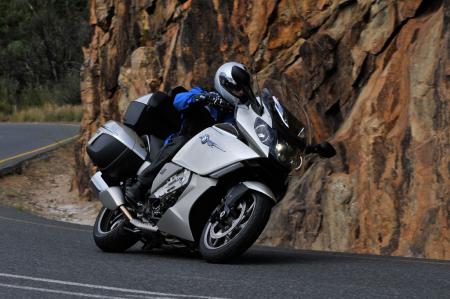 The K1600 GTL is a luxury-touring machine that thinks it’s a sportbike. The K1600 GTL is a luxury-touring machine that thinks it’s a sportbike. |
The venerable Gold Wing still holds a clear superiority in passenger accommodations and a slight advantage in ultra-low-speed handling, but the K1600 GTL otherwise significantly advances the super-touring category in every other way possible.
Simply put, the GTL has become the supreme luxury-sport motorcycle ever built.
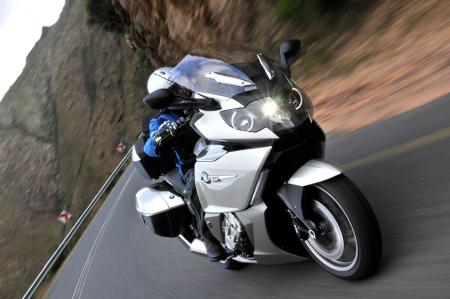 In a race from coast to coast, the K1600 GTL will do it quicker and in more comfort than anything else on the market. In a race from coast to coast, the K1600 GTL will do it quicker and in more comfort than anything else on the market. |



 9:17 AM
9:17 AM
 Unknown
Unknown


 Posted in:
Posted in: 




1 comments:
I am reading your post from some days and they are good this is the first time I comment. So all the best for your future post.
What is SSL Certificate? | How to bring traffic from Reddit| What is Bootstrap?.
Post a Comment